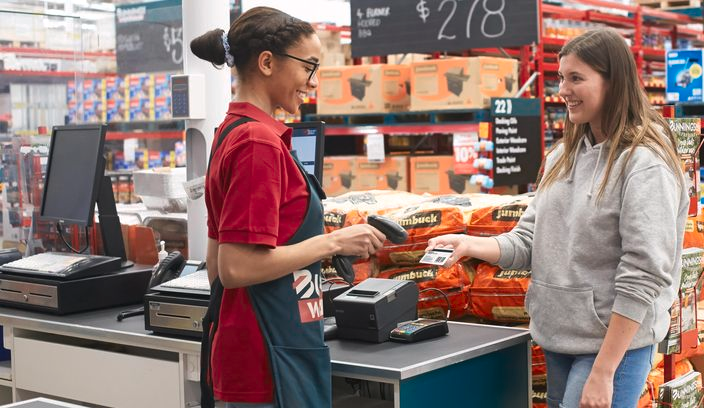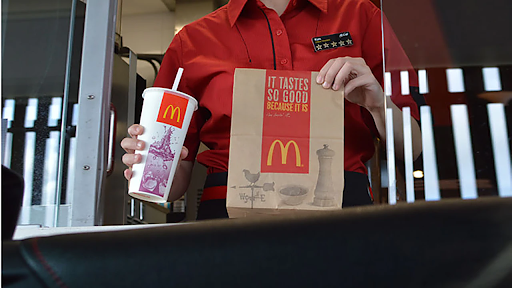Brands Need Investment in Service & Staff
Currently we are facing a new crisis as Australia’s major populous states emerge from extensive lockdowns. The not-unexpected labour shortage is hitting sectors from hospitality and logistics, to agriculture and retail. This is a real, easily measurable problem, however one that will rationalise itself in the mid to long term.
Another more hidden challenge is not the quantity of staff, but the quality. Frontline retail and sales staff have been ignored, under-utilised and deserve serious investment from brands and marketers looking to win via this critical stakeholder in the customer journey.
The share of retail spend in 2020 was 16.3% online, compared to 83.6% offline. In-person retail still dominates.
Source: Australia Post - Inside Australian Online Shopping - eCommerce Industry Report 2021
Despite online sales booming due to enforced circumstances, we have already seen the return of the hordes to shopping centres and major retailers in significant numbers. Humans love the experience of walking the aisles of Bunnings, flicking through racks of clothing and homewares in Kmart and sitting on (and smelling) new car leather seats in Mercedes. Apple even had the audacity to create their ‘genius bar’ customer service solution and hyper-trained product experts.
Whilst all of these brands continue to pivot their customer journey to enable smoother eCommerce solutions (delivery plus click & collect are a tried-and-true example) they are predominantly offline, bricks and mortar retail sellers. I expect we will continue to see the rise and investment in online UX, eComm & content for pre-store research. However, it does not hide the fact that the greater majority of shoppers will encounter real-life sales people in their purchase journey, at critical decision moments.
Sales & service staff are the critical customer journey stakeholders brands should invest in for outstanding return on investment.
McDonalds popularised the upsell with the phrase ‘would you like fries with that?’. Walk into any Maccas restaurant today, and you’re met with a barrier of screens for self-ordering & payment: a clear investment in technological solutions. But is it a replacement for staff? Absolutely not. Countries such as Japan, the United Kingdom, Italy and Germany haven’t lost the taste for in-person ordering. McDonalds recognises front line staff and customer service remain a key part of their customer experience and continue to be recognised for their highly regarded training standards and programs.
A cornerstone of Australia’s hardware store landscape, it won’t come as a surprise to many that Bunnings has consistently been voted to have Australia’s best customer service.
The experience of being able to simply ask one of their green-aproned team for product recommendations, and - if you’re in-store - the ability to pick the brains of the DIY experts, is unmatched. Tricia Olsen from International Customer Service Professionals has noted that Australian consumers expect a high level of customer service from their shopping experience: and this is the experience they receive from Bunnings’ frontline sales staff. The knowledgeability and approachability of their staff in-store is unmatched.
These frontline staffers are the key to positive customer experience; a key metric to deliver sales conversion. Whilst these learnings may not be entirely new, we need to consider what they mean in a post-Covid landscape. It highlights that these in-store experiences are most important and they require commensurate investment. You can’t lean on these DIY champions through an online experience in the same way.
Few businesses have pivoted to the extent that MECCA has as a result of Covid-19, and even fewer have done it so successfully. The beauty powerhouse has always hinged its business model on customer experience and this was a key factor to consider when all activity had to be shifted online.
Going from 500,000 shoppers moving throughout stores to zero poses obvious challenges in a sphere where trying before buying and consulting with expert staff members is a huge element of the shopping experience. MECCA founder Jo Horgan believes that the past two years have been a case study into the connection between online and in-store retail, using the digital to maintain engagement with customers. The key to bridging this gap has been the MECCA sales staff.
“The most powerful marketing lever we have is our customer service and services,” - Jo Horgan, MECCA founder
Horgan has emphasised the importance of staff members in the new, hybrid shopping experience by spending heavily in this area: MECCA invests double the market norm on in-store staff members and three times the market norm on staff education and engagement. MECCA’s digital success is clearly attributed in part to the investment in staff, which in turn affects the customer experience. It’s clear that the staff are the beating heart of MECCA and thus it isn’t something that can be overlooked.
Despite the enforced online wave that the world has experienced, everyday shoppers still crave person-to-person contact and communication in their customer journey; this element of the traditional, in-person sales process has been immune to the ‘new’ way of shopping. Chatbots and other digital customer service elements are not sufficient alone to replace the impact of frontline salespeople.
The common thread is clear: investing in sales & service staff members is critical in maintaining a brand’s positive customer experience.
Retailers and their supply brands must invest in their sales & service people, the individuals that drive much of the sales process in the retail environment. Making your frontline, customer-facing team members knowledgeable and consistent is the key to a happy customer experience, sales conversion and ongoing retention. Placing effort and investment in making your frontline staff experts is vital in making a robust and positive shopping experience.


